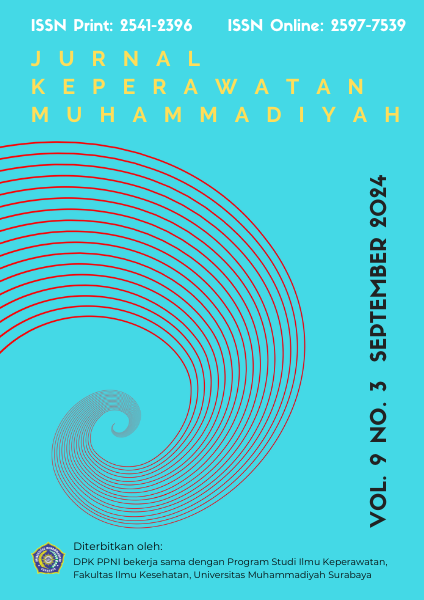THE RELATIONSHIP OF MOTHER'S KNOWLEDGE ABOUT THE FIRST 1000 DAYS OF LIFE AND STUNTING INCIDENTS
DOI:
https://doi.org/10.30651/jkm.v9i3.22376Keywords:
Toddlers, Stunting, 1000 HPKAbstract
Objective: The World Health Organization (WHO) states that children under five in the world experience stunting problems where the number of stunting in Indonesia is in the top 5 countries in the world. The problem of fulfilling nutrition in the first 1,000 days of life (HPK) faced by mothers in Indonesia is one of the factors that causes problems in children's growth and development, one of which is stunting. Knowledge of 1,000 HPK is important, especially during the growth and development period of children starting from 0 days of pregnancy to 2 years old. Knowledge will increase along with the mother's attitude regarding fulfilling balanced nutrition. Methods: This type of research is quantitative descriptive research with a cross sectional approach. This research was conducted in Yangapi Village, Tembuku Bangli District. The population in this study was 237 mothers with toddlers aged 0-24 months. The sampling technique used is non-probability sampling with purposive sampling type. Data analysis used the Spearman Rank Correlational test with an error rate of 5% (0.05). Results: The results of the study showed that the majority of mothers had sufficient knowledge, namely 77 people (51.7%), the majority of toddlers were in the normal category, namely 135 toddlers (90.6%). The results of the analysis obtained a p-value of 0.011, where the p-value is less than the p-value of 0.05, which means there is a relationship between the mother's level of knowledge about 1000 HPK and the incidence of stunting in toddlers. Conclusion: Mother's knowledge influences food consumption patterns, especially toddlers. Lack of knowledge about nutrition results in low food diversity and quality. Nutritional disorders are also caused by the mother's lack of ability to apply information about the 1000 HPK in daily life.
References
Arnita, S., Rahmadhani, D. Y., & Sari, M. T. (2020). Hubungan Pengetahuan dan Sikap Ibu dengan Upaya Pencegahan Stunting pada Balita di Wilayah Kerja Puskesmas Simpang Kawat Kota Jambi. Jurnal Akademika Baiturrahim Jambi, 9(1), 7. Retrieved from https://doi.org/10.36565/jab.v9i1.149
Aryastami, NK. (2014). Pertumbuhan usia dini menentukan pertumbuhan usia pra pubertas (studi longitudinal IFLS 19931997-2000). Disertasi FKM UI.
Aridiyah,dkk (2015) tentang factor-faktor yang mempengaruhi kejadian stunting pada anak Balita di wilayah pedesaan dan perkotaan, FKM Universitas jember
Arnita, S., Rahmadhani, D., & Sari, M., (2020), Hubungan Pengetahuan dan Sikap Ibu dengan Upaya Pencegahan Stunting pada Balita di Wilayah Kerja Puskesmas Simpang Kawat Kota Jambi, Jurnal Akademika Baiturrahim Jambi, 9(1), 7.
Kementerian Kesehatan. Infodatin Pusat Data dan Informasi Kementerian Kesehatan RI: Situasi Balita Pendek [Internet]. Jakarta; 2016. Available from: www.depkes.go.id
Nindyna Puspasari, Merryana Andriani. 2017. Hubungan Pengetahuan Ibu tentang Gizi dan Asupan Makan Balita dengan Status Gizi Balita (BB/U) Usia 12-24 Bulan. Jurnal Ilmiah, Fakultas Kesehatan MasyarakatUniversitas Airlangga.
Nina Fentiana DG, Zuhairiah,. Ketahanan Pangan Rumah Tangga Balita 0-59 Bulan di Desa Prioritas Stunting. Jurnal Kesehatan. 2019;12 (1).
Nursalam. (2017). Metodologi Penelitian Ilmu Keperawatan : Pendeketan Praktis (P. Puji Lestari (ed.); 4th ed.) : Salemba Medika.
World Health Organization. Nutrition: Stunting in a nutshell [Internet]. World Health Organization. 2019 [cited 2019 Oct 17]. Available from: www.who.int/nutrition
Downloads
Published
Issue
Section
License
Copyright (c) 2024 Niken Ayu Sari, Mira

This work is licensed under a Creative Commons Attribution-ShareAlike 4.0 International License.
- Penulis tetap memegang hak atas karyanya dan memberikan hak publikasi pertama kepada jurnal ini yang secara simultan karya tersebut dilisensikan di bawah:Â Creative Commons Attribution-ShareAlike 4.0 International (CC BY-SA 4.0)













